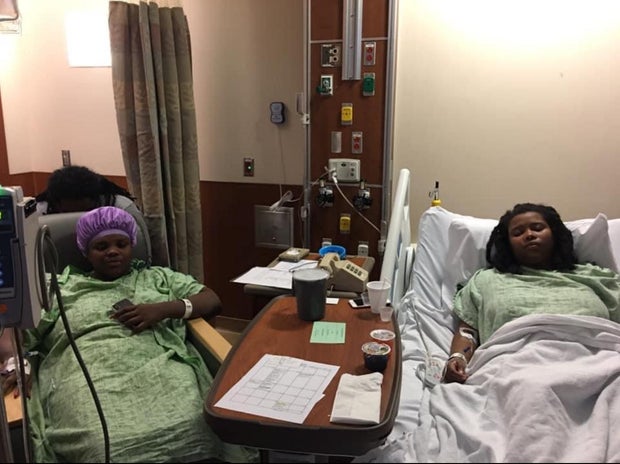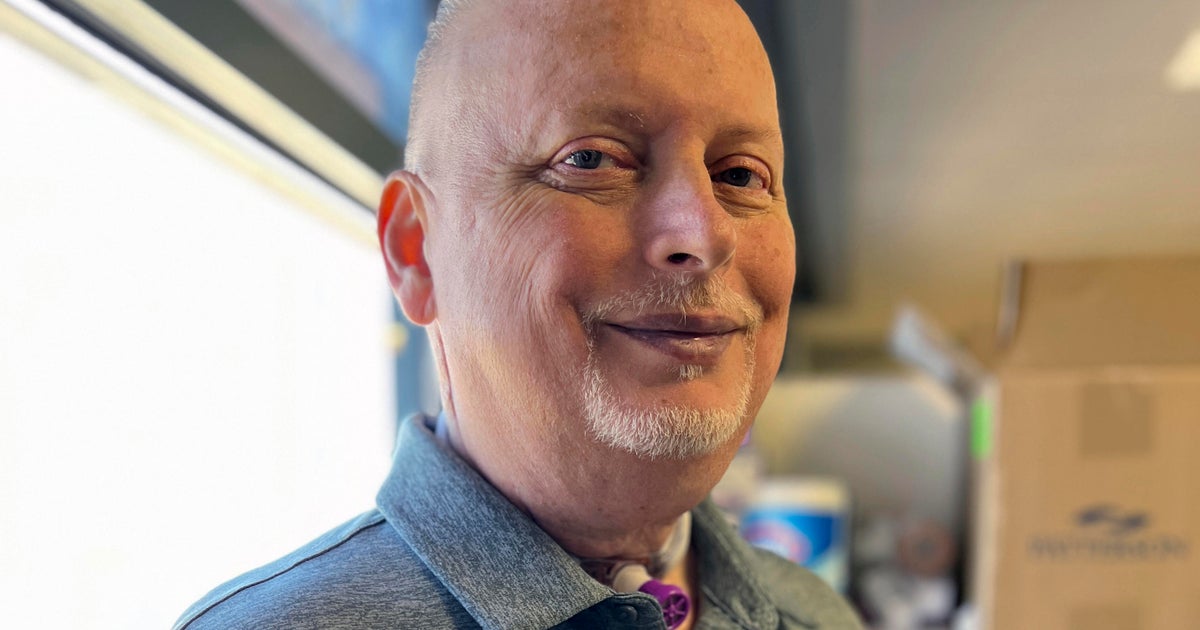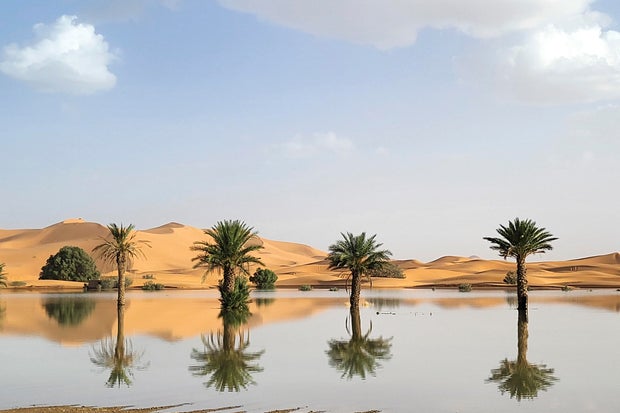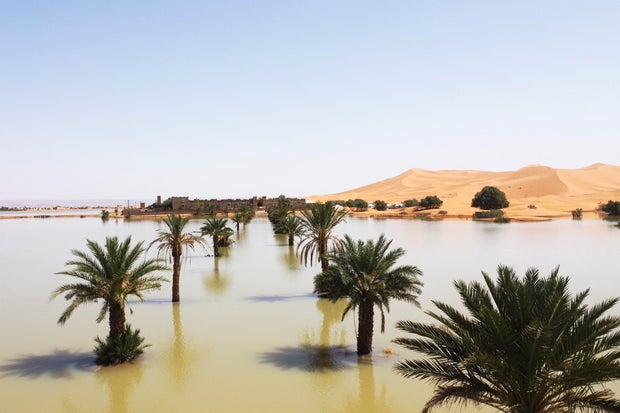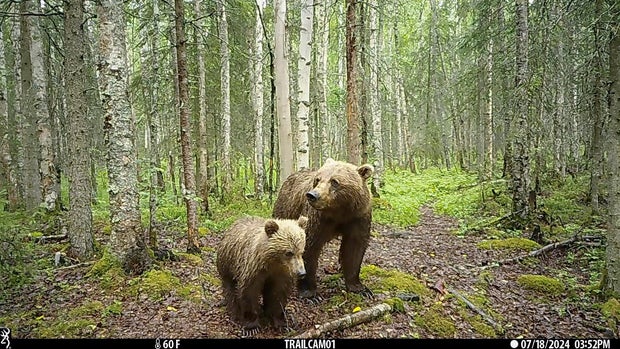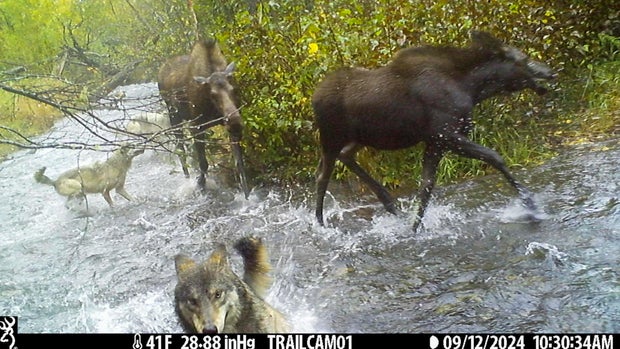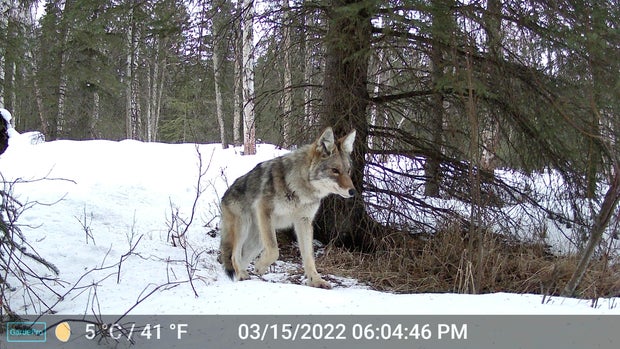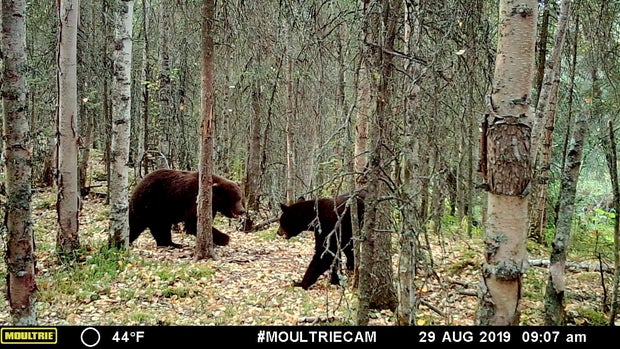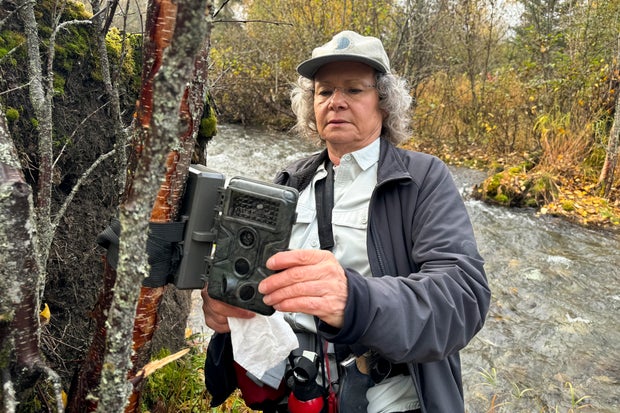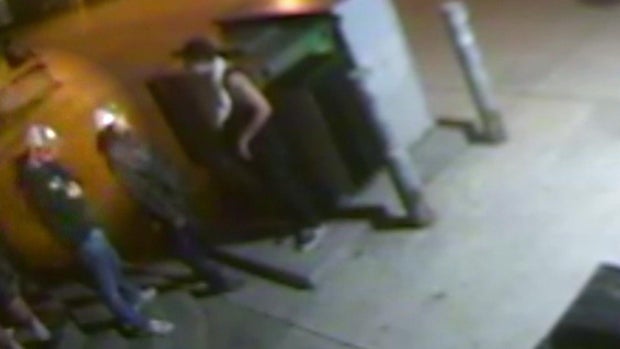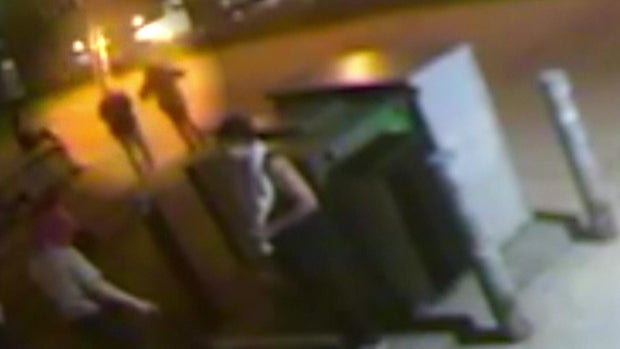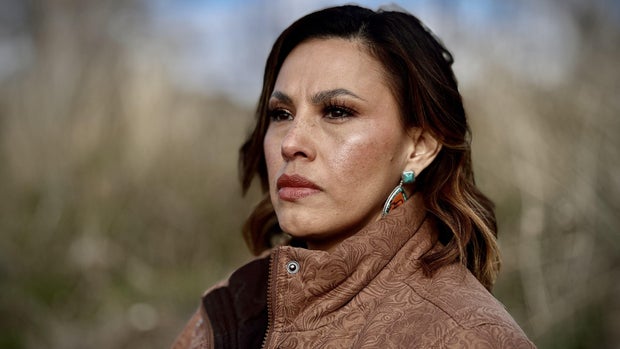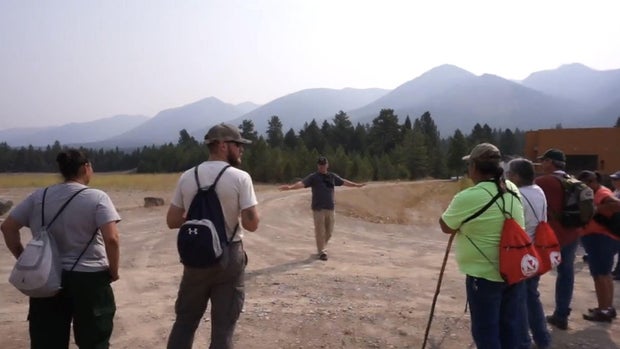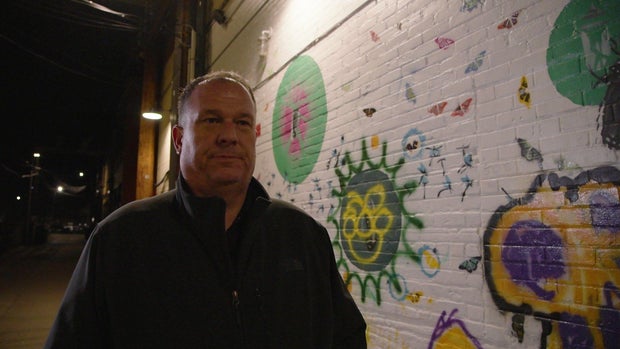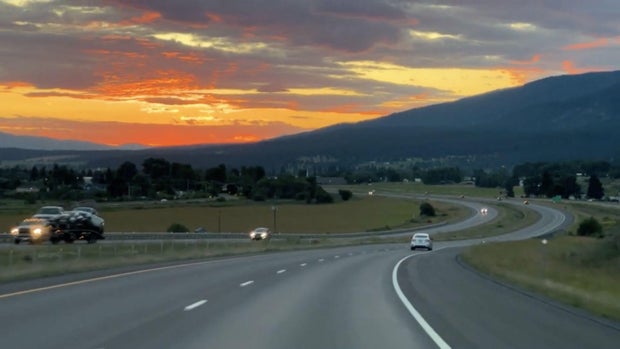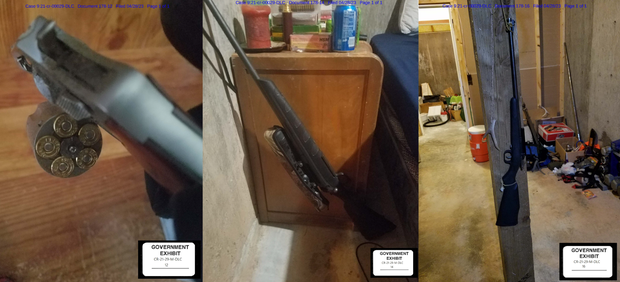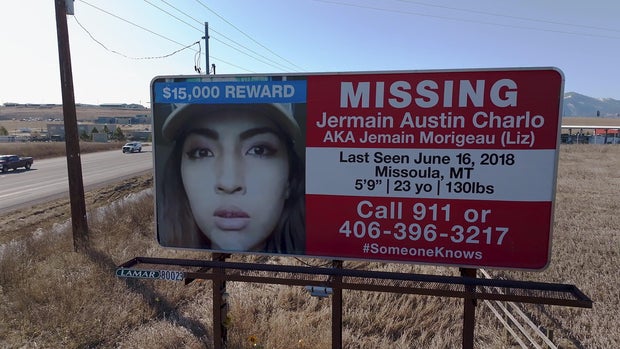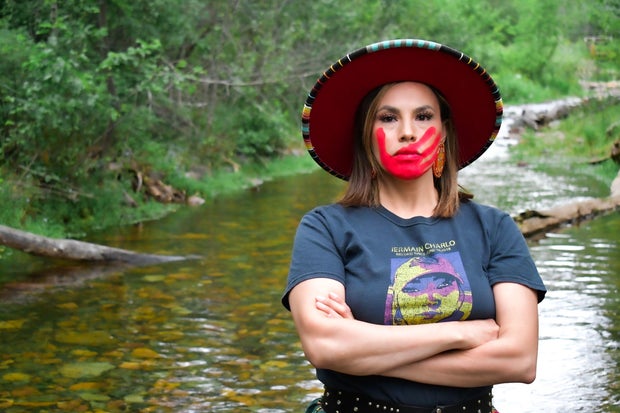CBS News
Her little sister needed a kidney. The donation let them both live their dreams
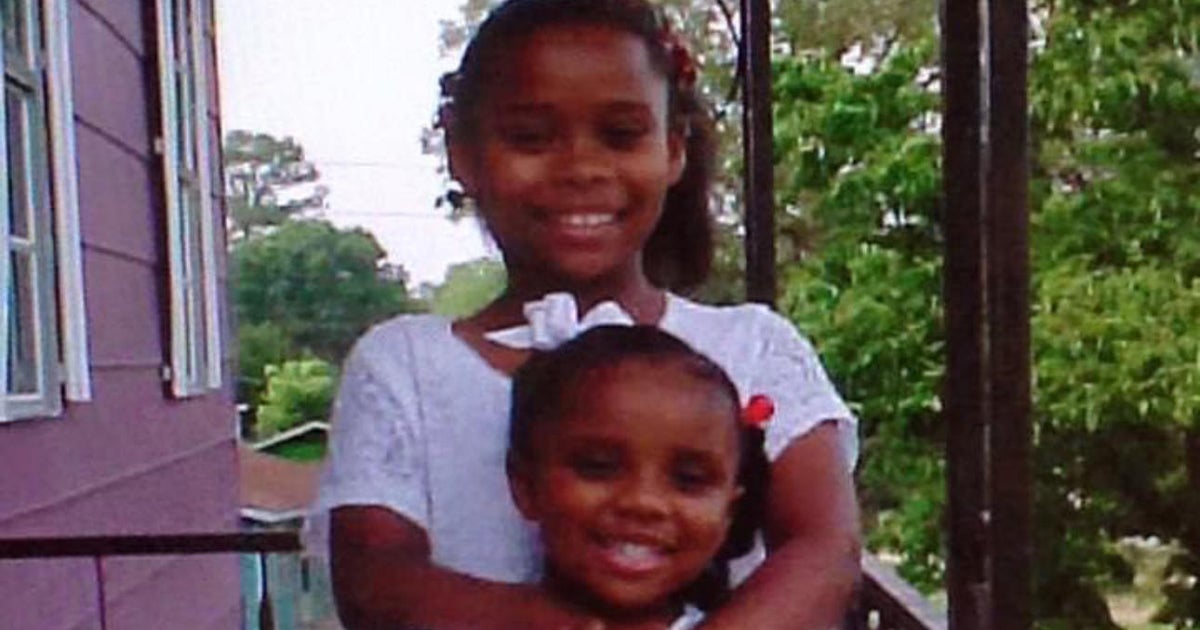
As children, sisters Amaris and Dominique Elston were inseparable. Their parents remember the two of them sharing everything and always having each others’ backs, no matter the situation.
That bond didn’t change as they grew older, and when an 18-year-old Dominique was diagnosed with focal segmental
glomerulosclerosis, a chronic kidney disease that soon led to kidney failure, Amaris was again ready to help her sister.
“I told Amaris ‘Dominique is in kidney failure. Her kidney function was at 19%, and she’s going to need a kidney transplant eventually,'” Denise Elston, their mother, said. “Thirty seconds later, Amaris said, ‘Can I give her one?'”
The Elston family
Amaris, then interviewing for medical schools, knew her family had a history of kidney disease, so she wasn’t sure she’d be able to donate. Dominique didn’t want her sister to put her life on hold but as her condition deteriorated and her kidney function dropped to just 5%, despite dialysis treatments, Amaris knew she had to do something. Without telling Dominique, she got tested and learned she was a match.
“She’s my little sister,” Amaris said. “As a big sister, it’s natural to want to jump in and save her from everything that life has to offer, even failing kidneys. I knew this was the best option that she had at getting back on track with life and doing all the things she wanted to do. It was never really a question.”
Avoiding years on a waiting list
About 140,000 people are on the waiting list for a kidney transplant in the United States, according to Dr. Kelly Birdwell, medical director of kidney transplantation at Vanderbilt University Medical Center, who was not involved in the Elston sisters’ care.
The average American waits about five years for a kidney donation through the waiting list. Black Americans are also disproportionately represented on the waiting list, Birdwell said. Black people are more likely to have Type B blood, which has fewer compatible donors, she said, and there is also “an excess risk of kidney disease in the African American population.”
In 2019, more than 14,000 Black kidney transplant candidates were moved up on the national waitlist after it was found a widely-used test was overestimating how well Black people’s kidneys were functioning, making them seem healthier than they were and extending the amount of time they waited.
Amaris said all of those factors were on her mind when she decided she wanted to donate to her sister. In 2023, 21,765 kidney transplants were completed, with 6,294 of those organs coming from living donors. About 60% of living donors are related to the recipient, Birdwell said.
To donate a kidney, interested family members do a round of initial testing that confirms the donor is compatible with the recipient. That’s followed by a longer evaluation, Birdwell explained, to make sure the donation won’t put the potential donor at risk. The evaluation includes bloodwork and imaging to confirm the potential donor is in good health. Once those stages are successfully completed, it’s just a matter of scheduling the surgery.
For the Elstons, that meant waiting until Amaris finished her first semester of medical school at the University of Alabama at Birmingham. In December 2018, the sisters were again side-by-side, waiting for their operations at the University of Vanderbilt’s Transplant Center. Amaris’ operation was first. Birdwell estimates that a donor surgery is about two hours, while a recipient’s surgery, scheduled for later in the day, is about three hours.
When Amaris and Dominique reunited after their operations, the eldest of the two could already see a change in her baby sister.
“I remember laying in the bed and being in a lot [of] pain, and Dominique walking down the hallways like ‘No big deal,’ and in that moment, it solidified that I knew I had made the right decision,” Amaris said. “She looked like a whole new person, in less than 24 hours. She was just bopping in my room, sitting in my chair. It was worth it.”
The Elston family
Working together to save lives
Amaris gave her younger sister more than a kidney. She also gave Dominique the chance to follow her sister into the field of medicine.
Amaris graduated from UAB’s Heersink School of Medicine in 2022. Just two years later, Dominique graduated from the UAB School of Nursing with her bachelor’s degree in nursing. Amaris cheered her on from the audience.
“After going through what we went through, it was kind of like a calling for me to go into (nursing),” Dominique said. “It wasn’t really something I had to think about. I felt like it was something that was meant for me.”
The Elston family/UAB
Now, both sisters are working in the neurology field. Amaris is a neurology resident at the Medical University of South Carolina, and Dominique is a neurology intensive care unit nurse at UAB. The two are the first members of their family to enter the medical field. Though the sisters are now separated by more than more than 400 miles, their bond is stronger than ever.
“It’s been fun having somebody that is with you through everything, because if you want to talk about the bad parts, the good parts, you can,” Amaris said. “It feels good to know that there’s somebody right beside you that can understand how you feel and what you’re going through. We’ve been each other’s best friends amid some of our darkest moments, so this is just another journey that we’re on together.”
CBS News
Rare deluge floods parts of the Sahara desert for the first time in decades

A rare deluge of rainfall left blue lagoons of water amid the palm trees and sand dunes of the Sahara desert, nourishing some of its driest regions with more water than they had seen in decades.
Southeastern Morocco‘s desert is among the most arid places in the world and rarely experiences rain in late summer.
The Moroccan government said two days of rainfall in September exceeded yearly averages in several areas that see less than 10 inches annually, including Tata, one of the areas hit hardest. In Tagounite, a village about 280 miles south of the capital, Rabat, more than 3.9 inches were recorded in a 24-hour period.
The storms left striking images of water gushing through the Saharan sands amid castles and desert flora. NASA satellites showed water rushing in to fill Lake Iriqui, a famous lake bed between Zagora and Tata that had been dry for 50 years.
AP Photo
According to NASA, such an occurrence is so rare in the region that a lake in Algeria, Sebkha el Melah, had only been filled six times from 2000-2021.
In desert communities frequented by tourists, 4x4s motored through the puddles and residents surveyed the scene in awe.
“It’s been 30 to 50 years since we’ve had this much rain in such a short space of time,” said Houssine Youabeb of Morocco’s General Directorate of Meteorology.
Such rains, which meteorologists are calling an extratropical storm, may change the course of the region’s weather in months and years to come as the air retains more moisture, causing more evaporation and drawing more storms, Youabeb said.
AP Photo
Six consecutive years of drought have posed challenges for much of Morocco, forcing farmers to leave fields fallow and cities and villages to ration water.
The bounty of rainfall will likely help refill the large groundwater aquifers beneath the desert that are relied upon to supply water in desert communities. The region’s dammed reservoirs reported refilling at record rates throughout September. However, it’s unclear how far September’s rains will go toward alleviating drought.
Water gushing through the sands and oases left more than 20 dead in Morocco and Algeria and damaged farmers’ harvests, forcing the government to allocate emergency relief funds, including in some areas affected by last year’s earthquake.
CBS News
Trail cameras capture the magical and violent world of Alaska’s wildlife

Millions of people worldwide tuned in for a remote Alaska national park’s “Fat Bear Week” celebration this month, as captivating livestream camera footage caught the chubby predators chomping on salmon and fattening up for the winter.
But in the vast state known for its abundant wildlife, the magical and sometimes violent world of wild animals can be found close to home.
Within half a mile of a well-populated neighborhood in Anchorage, the state’s biggest city, several trail cameras regularly capture animals ranging in size from wolverines to moose. And a Facebook group that features the animals caught on webcams has seen its number of followers grow nearly sixfold since September, when it posted footage of a wolf pack taking down a moose yearling.
Donna Gail Shaw via AP
But it’s not all doom-and-gloom videos on the page, and the actual death of the moose calf was not shown. The group, named Muldoon Area Trail Photos and Videos, also features light-hearted moments such as two brown bear cubs standing on their hind legs and enthusiastically rubbing their backs against either side of a tree to mark it.
Ten cameras capture lynx, wolves, foxes, coyotes, eagles, and black and brown bears — “just whatever is out here,” said Donna Gail Shaw, a co-administrator of the Facebook group.
In addition to the 290,000 or so human residents of Anchorage, nearly 350 black bears, 65 brown bears and 1,600 moose also call it home.
Joe Cantil, a retired tribal health worker, said the idea for the page started when looking down at the vast open lands of Alaska from an airplane on a hunting trip near Fairbanks.
“You’re out in the middle of nowhere, so you see animals acting however they act whenever we’re not around,” he said.
Donna Gail Shaw via AP
He later met wildlife officials in the Anchorage park conducting an inventory of predators. He saw them set up a trap and three webcams where a moose had been killed.
“When I saw that, I thought, ‘Yeah, I can do that,'” he said.
Cantil set up a low-tech camera and caught his first animal on it, a wolverine, fueling a passion that led to the creation of the Facebook page in 2017.
Then, while hiking, he met Shaw, a retired science education professor and associate dean of the College of Education at the University of Alaska Anchorage.
Shaw was intrigued by his game cameras and began bugging him to see the footage.
“Well, he finally got tired of me pestering him and one day he said, ‘You know, you can get your own camera,’ and so that started my hobby,” said Shaw, a native of Texas.
Donna Gail Shaw via AP
She started by strapping a single $60 camera to a tree. Now she has nine cameras, seven of which are active in Far North Bicentennial Park, a 4,000-acre park stretching for miles along the front range of the Chugach Mountains on the east side of Anchorage.
Her cameras are set up anywhere between a quarter-mile to a half-mile of the Chugach Foothills neighborhood and she frequently posts to the Facebook group page. Cantil also posts videos from his three cameras.
“I knew there was wildlife out here because I would occasionally run into a moose or a bear on the trail, but I didn’t know how much wildlife was out here until I put the cameras on it,” Shaw said.
She replaces batteries and storage cards about once a week, walking into the woods to do so armed with an air horn to announce her presence, two cans of bear spray and a .44-caliber handgun for protection.
Donna Gail Shaw via AP
Many of the page’s followers are Anchorage residents looking for information about which animals may currently be roaming around the popular trail system. Other users join to see what the cameras capture, including people from other states who “enjoy looking at the wildlife that we have here,” she said.
Shaw said that every few years, her cameras catch a wolf or two — and sometimes even a pack. This year she was surprised when a pack of five wolves came by, walking quietly in a single file.
Last month, while she collected memory cards, she saw moose fur on the ground across the creek from two of her cameras. After she spotted what looked like a roughed-up patch of dirt where a bear might bury its kill, she assumed it was another moose attacked by a black bear, similar to what happened earlier not too far away.
AP Photo/Mark Thiessen
But when she checked the memory card, it instead showed the wolves taking down the moose yearling as the moose’s mother attempted to protect her offspring by trying to kick the wolves away with her long legs.
Now, the demand for the page is growing, but Shaw said she’s done adding cameras.
“I think I’m at my camera max,” she said. “Nine is enough!”
CBS News
The investigation into Montana mom Jermain Charlo’s disappearance
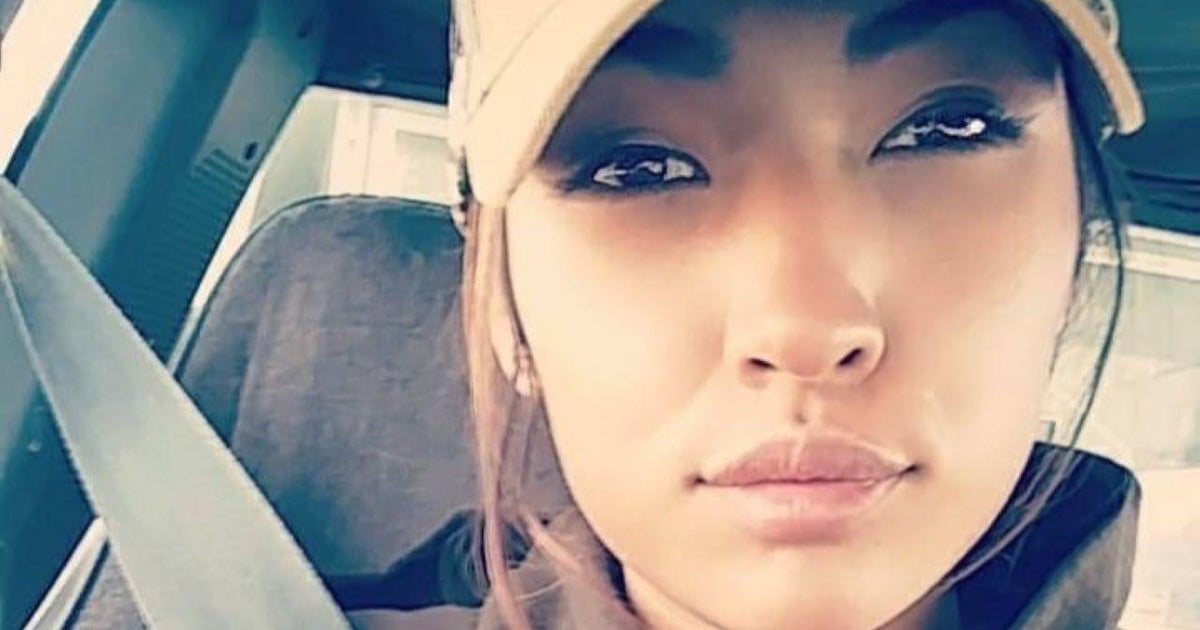
When Jermain Charlo‘s cellphone went silent in June 2018, her family suspected something was wrong. “She was very active on social media … she posted about everything,” Valenda Morigeau, Charlo’s aunt, told “48 Hours.” “So for her to not be active on social media, then I knew something was not right.” When Charlo didn’t respond to calls or texts, Morigeau, sick with worry, reported her missing to the Missoula Police Department. Six years later, Charlo still has not been found.
Valenda Morigeau
During that time, the Missoula Police Department and other agencies have been hard at work. What have investigators discovered about what may have happened to Charlo? And will she ever be found?
The story begins on the night Charlo was last seen.
June 15, 2018: Last night out at The Badlander bar
Missoula Police Department
On the night she disappeared, Jermain Charlo was at The Badlander bar in Missoula, Montana, around midnight. She’s captured in the alley behind the bar on security camera footage excerpt, shared exclusively with “48 Hours.” Charlo, second from left, is highlighted.
Detectives spoke to multiple people who were in the alley, including the man standing behind Charlo. He’s Michael DeFrance, Charlo’s ex-boyfriend and the father of her two children. Charlo and DeFrance had plans together that night, though it’s not clear why they met up or what they discussed.
June 15, 2018, just before midnight: Disappearing into the night
Missoula Poilce Department
Just before midnight on June 15, Charlo and DeFrance walked away in the alley behind The Badlander bar, as seen in this screenshot from security footage.
Where did they go next? When investigators asked Michael DeFrance that question, he told them the same thing he told Charlo’s family when they asked: that he and Charlo had gotten into his truck and then he’d dropped her off at the Orange Street Food Farm, a supermarket about a five-minute drive from The Badlander.
In a subsequent police interview, however, DeFrance amended his story. He said that in fact he’d dropped Charlo off not at the Orange Street Food Farm itself, but in a residential area eight blocks west of the store. He said he dropped her off there because Charlo told him she was staying with a friend named “Cassidy” who lived nearby.
Detectives found the change in DeFrance’s stories interesting. They also were unable to find anyone in Charlo’s life named “Cassidy.” It turned out that Charlo didn’t really intend to stay at a friend’s place that night, but at the apartment of her then-boyfriend Jacob, who lived in the area. Jacob was out of town but had told Charlo she could stay at his place.
Jermain’s family suspects that she did not want to tell DeFrance about her relationship with Jacob and may have lied to him about “Cassidy.”
June 16, 2018, just before 1 a.m.: Jacob tries to call Jermain Charlo
Valenda Morigeau
Shortly before 1 a.m. that night, Charlo’s boyfriend Jacob attempted to call her cell. She never picked up the phone — instead, it rang several times before going to voicemail. Jacob told police he suspected that somebody purposely ended the call.
Though detectives never considered Jacob a suspect — he was out of the state that night — they did talk to him further to see what else he might know. He told them that the day before Charlo disappeared, she told him “that Michael had been yelling at her, asking if she was dating anyone and wanted to get back together with her.”
DeFrance has also never been named a suspect in Charlo’s disappearance.
June 17, 2018: Jermain Charlo reported missing
CBS News
On June 17, 2018, Charlo’s mother reported her missing to the Tribal Police Department on the Flathead Reservation, but because Jermain went missing in Missoula, it would have to be reported to the Missoula Police Department.
Family called Missoula police but learned that the report had to be made at the station in person, not over the phone. So on June 20, 2018, Valenda Morigeau, Charlo’s aunt, made the drive to Missoula and spoke with an officer to file an official report.
Late June 2018: The community searches
KPAX
After Charlo disappeared, her family took matters into their own hands and contacted local organization The Lifeguard Group for help. Volunteers came out in support to search for Charlo. This was just the first of many searches the community would hold over the months and years to come.
“We’ve told the family that we’re not going to stop no matter what. And we will search for Jermain as if she’s alive, until we find her,” said Lowell Hochhalter, president and co-founder of The Lifeguard Group.
June 26, 2018: The lead detective
CBS News
The Missoula Police Department’s investigation began the day Morigeau reported her niece missing. However, the first detective assigned only worked the case briefly before he had scheduled time off. It wasn’t until June 26, 10 days after Charlo disappeared, that Det. Guy Baker was assigned to the case. He would doggedly lead the investigation for the next six years, determined to find Charlo.
“I’m very much committed to finding her,” Baker told “48 Hours.” “I wanna bring justice to Jermain and hold accountable who’s responsible.”
June 27, 2018: The cellphone data
CBS News
On June 27, 2018, detectives obtained data linked to Charlo’s cellphone. The data indicated that between the hours of 2 a.m. and 10 a.m. in the early morning hours of June 16, 2018, after she disappeared, Charlo’s cell was pinging off a cell tower in the area known as Evaro Hill.
Evaro Hill is a rugged, heavily forested area north of Missoula, and it’s where DeFrance, Charlo’s ex-boyfriend, was living at the time. DeFrance told investigators that he’d dropped Charlo off in Missoula around 1 a.m. So, why was her phone pinging north of the city hours later? DeFrance changed his story and told investigators that Charlo’s phone was with him.
Missoula County Deputy Attorney Brittany Williams told “48 Hours,” “In a subsequent interview, [DeFrance] provided a statement that she left her cellphone and he attempted to go through her cellphone and he was unable to get into her cellphone.”
Then DeFrance told authorities that two days later on June 18 — while Charlo’s family was desperately calling law enforcement for help — he discarded Charlo’s phone in Idaho at mile marker 94 on Highway 12. Law enforcement searched the area but never found the phone.
“The phone’s never been recovered,” confirms Baker. Charlo’s family wonders why DeFrance would throw Jermain’s phone away. Baker declined to comment on a possible motive for disposing of the phone. “48 Hours” requested an interview with DeFrance through his attorney. He declined our request.
June 27, 2018: Michael DeFrance’s mother speaks to police
On the same day that the cellphone data was obtained, officers from the Missoula County Sheriff’s Office went to DeFrance’s property and spoke with his mother Jennifer DeFrance. According to police documents, Jennifer DeFrance told an officer that Charlo had never been to the residence. She also reported that “Michael was still in love with Jermain and wanted to get back together with her.”
Summer 2018: “Swept away in an instant”
CBS News
Over the remainder of the summer, detectives investigated the idea that Charlo may have been a victim of human trafficking.
“We had some information early on that there might have been some people in Missoula from out of state that were trying to buy a girl,” Baker told “48 Hours.” “And I was thinking there was a connection there.”
Williams described the trafficking situation in the state. “I think people have an idea that Montana is rural and undeveloped, and we don’t have major crimes that occur here,” she said. “But the fact of the matter is, we have one of the largest interstates that runs through our state right here through Missoula, Montana … there are people who can be swept away in an instant.”
Eventually, investigators were able to rule out the idea that Charlo was a victim of human trafficking. Williams told “48 Hours” in 2024, “I think that we have enough evidence through this investigation that lends itself to believe something else has happened to her.”
August 2, 2018: A warrant for Michael DeFrance’s property
An officer with the Missoula County Sheriff’s Department filed a search warrant application on August 2, 2018, that stated the officer had reason to believe that a crime had been committed in Missoula.
The application asked a judge to approve a search of DeFrance’s property on Evaro Hill. The officer hoped to “visually observe and simultaneously video record by ground or air, at any time of the day or night, the outside of the premises including all grounds.” It also asked for thermal imaging of the property.
Documents show that the search warrant application was approved by a judge, but officers declined to comment on the results of any of their searches of the DeFrance property. They do confirm that Charlo has not been found, and Michael DeFrance has never been named a suspect or charged with anything in relation to her disappearance.
Oct. 2, 2018: Firearms seized
District Court of Montana
In October 2018, police conducted another search of DeFrance’s Evaro Hill property. At this point, Charlo had been missing for more than three months.
On the property officers found and seized guns including the ones pictured. DeFrance had a prior conviction that prohibited him from owning firearms. In May 2013, DeFrance had pleaded guilty to a misdemeanor charge of Partner or Family Member Assault against Charlo, his then-girlfriend. When DeFrance was sentenced for this incident, part of his sentence was a loss of his firearm rights.
According to a 2013 police report, DeFrance admitted to hitting Charlo with an open hand, then twice more with his fist. Charlo reported that DeFrance had shoved her onto the hood of his van, punched her in the ear, the temple, and the cheekbone, and then spit in her face and told her she was horrible.
In October 2018 Baker asked DeFrance if he was aware he wasn’t supposed to have firearms because of his previous conviction. According to court documents, DeFrance replied, “I was never clear on that.”
2019-2021: The trail goes cold
CBS News
In October 2018, Charlo’s family and the Confederated Salish and Kootenai Tribes put her information on a billboard. They hoped that someone would drive by and recognize Jermain. For six years, her gaze has haunted drivers as they travel down that road.
Baker wouldn’t tell “48 Hours” much about his investigation, as it is ongoing and many of the documents are sealed. But he insists the case never truly went cold. He has been consistently searching for Charlo over the years, and the investigation has never stopped. He is committed to finding Jermain.
“I guess when I see that billboard, I’m frustrated,” he said. “I’ve never worked a case like this before. We’ve tried to uncover and turn over every rock possible.”
July 28, 2021: Michael DeFrance arrested on firearms possession charges
In July 2021, Michael DeFrance was arrested for possession of the firearms police had confiscated in 2018. The case was investigated by the FBI. In October 2021, an indictment charged DeFrance with one count of prohibited person in possession of firearms and ammunition, and three counts of false statement during a firearms transaction.
April 26, 2023: Michael DeFrance goes on trial for firearms violations
DeFrance was found guilty of all four counts of firearms-related violations after his two-day trial in federal court. Charlo’s mother and her aunt Valenda Morigeau both testified to the nature of Charlo and DeFrance’s relationship around the time of the 2013 partner or family member assault conviction, and Baker spoke about finding the guns at DeFrance’s residence.
DeFrance was sentenced in September 2023 to 21 months in prison and was given a lifetime ban on firearms and ammunition. On the same day, DeFrance filed an appeal. He has not served any time pending that appeal.
Today: hoping for justice
Jen Murphy
Jermain Charlo’s family still hopes that one day she might be found, though they no longer believe she is alive. For Charlo’s aunt Dani Matt, justice for Charlo means “bringing her home, and letting her rest with our family up on the hill.”
“I will never stop looking for her,” said Morigeau. “I’ve met so many families that have had a loved one disappear. And I want other families to know that, like, it’s OK to keep pushing and it’s OK to keep their name out there. We have to fight for justice for our loved ones.”



